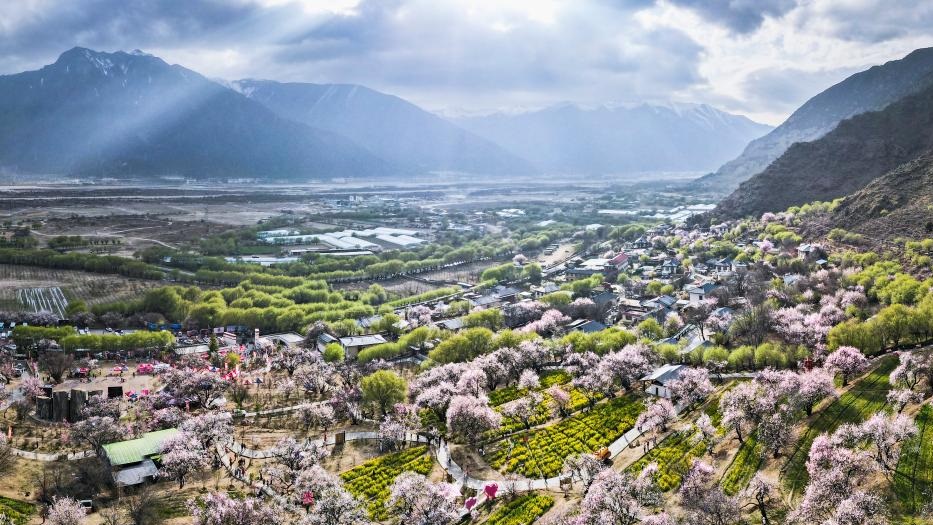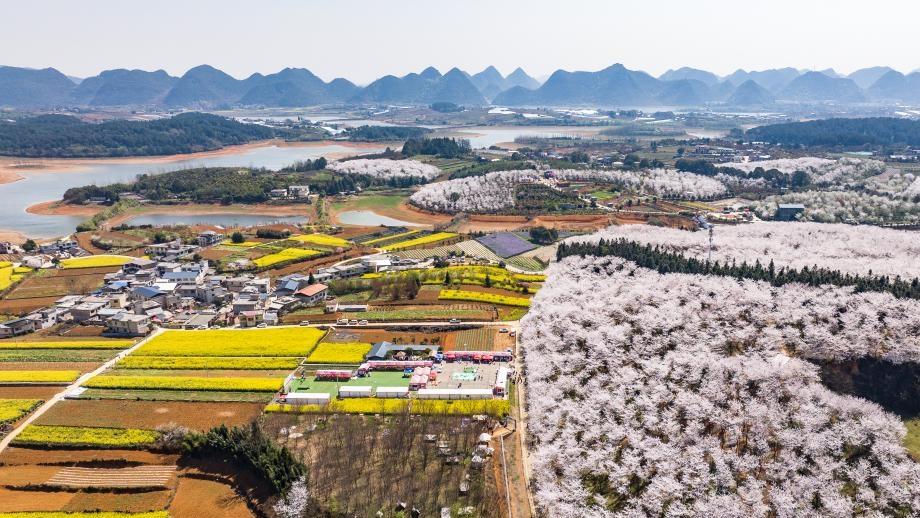Stories of High-Quality Development | Business environment optimization: An ongoing process
A strong business environment serves as a key advantage for local economic growth and is essential for promoting high-quality development.
At a symposium on private enterprises held on Feb. 17, 2025, General Secretary Xi Jinping pointed out that we should resolutely dismantle obstacles that prevent enterprises from accessing production factors equally and competing in the market fairly, further open the competitive areas of infrastructure to various business entities in a fair manner, and continuously make solid efforts to address the difficulties faced by private enterprises in obtaining affordable financing. Authorities should work to clear overdue payments owed to private enterprises. Special initiatives will be launched to regulate enterprise-related law enforcement, with a focus on tackling arbitrary charges, fines, inspections, and seizures. We must protect the legitimate rights of private enterprises and entrepreneurs in accordance with the law. All relief policies should be fully implemented with precision and equal treatment for all businesses. We should further form a new type of cordial and clean relationship between government and business.
Every requirement directly addresses the most pressing concerns voiced by businesses. From the 2025 government work report to the first meetings of the year across many regions, optimizing the business environment has become a priority. By improving the experience for enterprises, reform measures can better translate into high-quality development outcomes.
"A sound business environment is like sunlight, water and air — essential for market entities to thrive," said Wu Xiaoyan, director-general of the Center for the Promotion of Doing Business Environment at the National Development and Reform Commission, during People's Daily's video program "Stories of High-Quality Development."
She said that improving the business environment is a crucial step in building a high-standard socialist market economy system, a key prerequisite for advancing high-standard opening up, and a necessary requirement for modernizing the national governance system and capacity.
What can be learned from Hangzhou's drive to optimize the business environment?
Since the beginning of 2025, Hangzhou's "Six Little Dragons," each with their unique strengths, have emerged and sparked a wave of technological innovation.
It is no coincidence that these six scientific and technological startups were all born in Hangzhou.
"Throughout our journey, we've deeply appreciated the city's sincere and tireless efforts to optimize the business environment. Relevant departments have assisted us in expanding our factory premises, helped us attract talent, provided housing policies for employees, and worked with us to resolve employee concerns, allowing us to focus entirely on R&D and become a leader in robotics technology," said Chu Yang, marketing manager of Unitree Robotics.
A city's greatest gesture of goodwill to businesses lies in its patience and inclusivity. While the "Six Little Dragons" differ in their fields and technical approaches, they all commend the city's highly supportive business environment.
"Enterprises and employees are in the best position to judge whether a business environment is good," said Li Ziqiang, director of the Overseas High-level Talents Innovation and Entrepreneurship Service Center in Hangzhou High-Tech Zone (Binjiang).
"In optimizing the business environment, we follow the principle of 'proactive when necessary, non-intrusive when not.' We've strived to build a comprehensive government service system featuring 'one window for all needs, one stop for all services, and unwavering support for enterprises throughout their lifecycle,'" he said.
The business environment serves as both a mirror and a measuring stick — reflecting a region's political and social ecosystem while gauging the efficiency and conduct of its local government.
"Optimizing the business environment requires aligning an efficient market with a well-functioning government. This involves constantly refining the systems underpinning the market economy, enhancing resource allocation efficiency, and addressing business pain points in enterprises' operation and development to achieve flexible and effective governance," Wu said.
She explained that Hangzhou's boom in standout startups stems from the local government's consistent support for innovation, which has created a "rainforest-style" ecosystem where new businesses can thrive.
Why does the rule of law create the best business environment?
Legal protection is a crucial factor in creating an optimal business environment. A sound legal system promotes the healthy operation of a market economy.
Intellectual property is the lifeblood of enterprise development. For Huaming Power Equipment Co., Ltd., a Shanghai-based tap-changer manufacturer, intellectual property is the key to opening up the market.
According to Zhu Qiang, executive vice president of Huaming Power Equipment Co., Ltd., tap-changers were originally an imported technology. In China, their development has gone through three stages: imitation, replication and independent R&D. Today, his company holds over 300 patents in the field of tap-changers.
"As we develop, we frequently face challenges from imitators. When competitors engage in unfair practices, authorities provide strong, professional guidance to protect us. This concrete legal protection speaks louder than any slogan ever could," said Zhu.
Wu emphasized that the rule of law serves as a crucial foundation for a country's governance system and capacity, playing a pivotal role in solidifying foundations, stabilizing expectations and delivering long-term benefits. The rule of law creates the best business environment.
Facing both international and domestic competitive environments, a rule-of-law business climate serves as a reassuring anchor for enterprises.
“Putuo district has attracted numerous private and small-to-medium enterprises. Every day, we ponder three key questions: How can we make business operations more hassle-free? How can enterprises more easily secure funding? How can we inject more dynamism into their development?” explained Tang Weijun, deputy director of the Putuo District Development and Reform Commission, Shanghai.
He said that a "through train" scheme for legal services ensures a dedicated hotline with one-call appointment-making and personnel providing tailored support. Digital corporate health assessment services remind enterprises of relevant policies, helping them identify pain spots in advance and enhance risk prevention capabilities. Measures such as exemptions for first-time violations and no penalties for minor infractions in business operations have saved enterprises over 7 million yuan ($965,000) in fines in 2024.
These stories of development illustrate how an effective relationship between the government and businesses fosters success.
“Robust legal protection helps market entities thrive. A sound legal environment ensures that businesses prosper, just like plants thriving in ample sunlight," said Wu.
What are the keys to optimizing the business environment?
Malaysian Musang King durians, Singaporean bak kut teh, Filipino coconut water, Vietnamese coffee... Where can you find all these products in one place?
The answer is the China-ASEAN Mercantile Exchange in Nanning, capital of south China's Guangxi Zhuang Autonomous Region. Here, specialty products from the 10 ASEAN countries, as well as Japan, South Korea, Australia and New Zealand, are regularly exhibited and sold online and offline year-round.
"Agricultural trade has always been a crucial aspect of multilateral and bilateral cooperation between China and ASEAN countries," said Zhong Zimin, deputy director of the Finance Bureau at the Guangxi Nanning Wuxiang New Area Planning and Construction Administration Committee.
"We have been striving to further optimize the cross-border trade environment by enhancing service support, enabling foreign trade enterprises to conduct business more efficiently, conveniently and securely. Our ultimate goal in building an internationalized business environment is to eliminate all bottlenecks, challenges and pain points for foreign trade companies," he said.
Foreign investors' confidence in China stems from three key factors: the country's long-term economic growth trajectory characterized by stability and progress, its continually improving business environment and its expanding openness to the world.
Wu said that opening up is the strongest signal for investment. True openness involves connectivity in infrastructure and institutional innovation, ultimately realized through accelerated industry collaboration.
The business environment is not only conducive to improving administrative efficiency but also helps align with international standards.
Wu said that China has achieved significant results in improving its business environment. However, in practice, some regions still experience a gap between policies and the actual reality for market entities. To address this, Wu suggested properly handling four key relationships.
First, properly handle the relationship between an efficient market and a well-functioning government, emphasizing the proactive role of the government. Second, properly handle the relationship between policy provision and the actual reality for businesses, ensuring tangible benefits. Third, properly handle the relationship between top-level design and grassroots exploration, ensuring coordinated action. Fourth, properly handle the relationship between learning from international practices and Chinese characteristics, focusing on mutual exchange and learning.
In optimizing the business environment, there is no best outcome, only better ones. Wu noted that we must strive for excellence, continuously advancing this systematic effort with greater action and practical measures, stimulating the endogenous power and innovation vitality of hundreds of millions of market entities, and injecting endless momentum into the steady and long-term progress of Chinese modernization.
Photos
Related Stories
- China unveils guideline to improve social credit system
- Stories of High-Quality Development | Wu Xiaoyan: Hangzhou's formula to market success
- Stories of High-Quality Development | Guangxi transforms business environment: From open to smooth, fast to beneficial
- Stories of High-Quality Development | Hangzhou provides 'sunshine, rain and dew' for enterprises to thrive
- Stories of High-Quality Development | Shanghai's Putuo district: Safeguarding high-quality development
- China to promote high-quality development of aluminum sector, actively respond to trade frictions: plan
- China to push for digital transformation of light industry
- High-quality growth offers global boost
- China issues guideline on promoting high-quality development of renewable energy, green electricity certificate market
- China's regional powerhouses turbocharge high-quality development
Copyright © 2025 People's Daily Online. All Rights Reserved.









